本站不再支持您的浏览器,360、sogou等浏览器请切换到极速模式,或升级您的浏览器到 更高版本!以获得更好的观看效果。关闭

News & Events
On July 10, 2025, the "Celebration of the Decennial Anniversary of the Jingshi Philosophy Summer School and Opening of the 10th Jingshi Philosophy Summer School & 6th International Youth Program on Chinese Culture" was grandly held at the Yingdong Academic Hall of Beijing Normal University. The program was jointly organized by the Research Center for Value and Culture, School of Philosophy of Beijing Normal University, the International Confucian Association, and the Chinese Culture Institute | Jingshi Academy of Beijing Normal University. A total of 42 young scholars from 33 countries and regions, including France, Russia, the United Kingdom, the United States, Turkey, South Korea, and Chile, participated in the event. The theme of this year’s program is "Chinese Thought and Modern Civilization," aiming to explore the organic connections between China’s excellent traditional culture and modern civilization, promote global cultural understanding, respect, and integration, and advance the building of a community with a shared future for humanity.
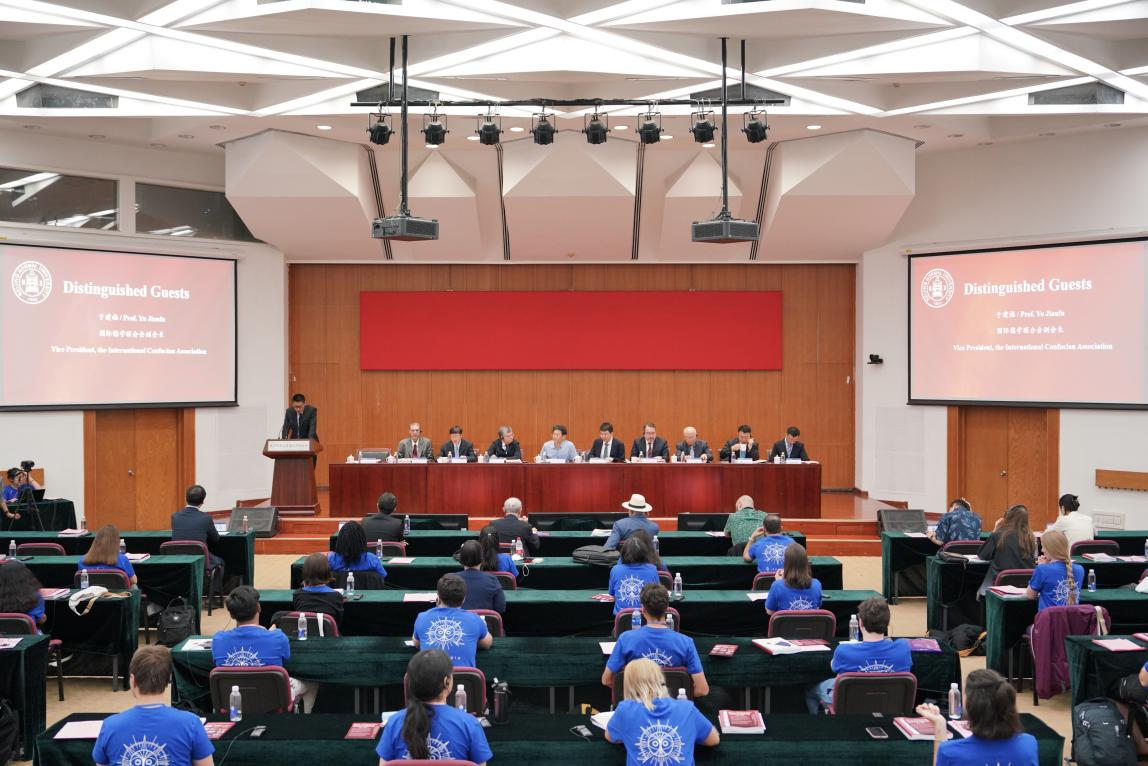
( Venue of the Opening Ceremony )
Distinguished guests attending the opening ceremony included: Chen Xing, Vice President of Beijing Normal University; Yu Jianfu, Vice President of the International Confucian Association; Pablo Arriarán, Ambassador of Chile to China; Han Zhen, Director of the Academic Committee of Beijing Normal University; Mircea Dumitru, Academician and Vice President of the Romanian Academy; Wu Xiangdong, Director of the Research Center for Value and Culture and Dean of the School of Philosophy at Beijing Normal University; Wang Yong, Director of the Division of Sinology Research at the Center for Language Education and Cooperation of the Ministry of Education; Xiao Kai, Vice Dean of the Jingshi Academy; Li Zhongshan, Deputy Director of the Office of International Affairs at Beijing Normal University; Thomas Michael, Research Fellow at the Research Center for Value and Culture of Beijing Normal University; Riccardo Pozzo, Sinologist and Professor at the University of Rome II; Hichem Messaoudi, Dean of the Higher Institute of Languages at the University of Carthage in Tunisia; Cristóbal Apara, Secretary of the Embassy of Chile in China; and Tobias Zürn, Assistant Professor at the Hong Kong University of Science and Technology. The opening ceremony was presided over by Dai Haiqiang, Assistant Dean of the School of Philosophy at Beijing Normal University.
At the beginning of the event, the distinguished guests and participants watched a video commemorating the "Decennial Anniversary of the Summer School." The video reviewed the journey of the summer school over the past ten years, featuring past domestic and international experts, scholars, and participants from around the world who extended their warm wishes to the new participants. Subsequently, addresses were delivered by Chen Xing, Vice President of Beijing Normal University; Yu Jianfu, Vice President of the International Confucian Association; and Pablo Arriarán, Ambassador of Chile to China.
Chen Xing extended a warm welcome to all the guests, faculty, and students, and expressed sincere gratitude to the International Confucian Association for its long-standing support and to the project team for their hard work. Chen shared the recent progress in the internationalization of education at Beijing Normal University and introduced the profound heritage of the philosophy discipline at the university. He pointed out that over the past decade, the "Jingshi Philosophy Summer School" has consistently focused on "Chinese Thought and Modern Civilization," aiming to guide international youth in deeply understanding the context of Chinese culture and traditional wisdom, and to build bridges for academic dialogue and cultural experiences, making philosophy a vibrant language for civilizational dialogue. Chen stated that building a community with a shared future for humanity is China's answer to the questions of our times, and Beijing Normal University is willing to work with global youth to create a future where "all flowers bloom together in harmony."
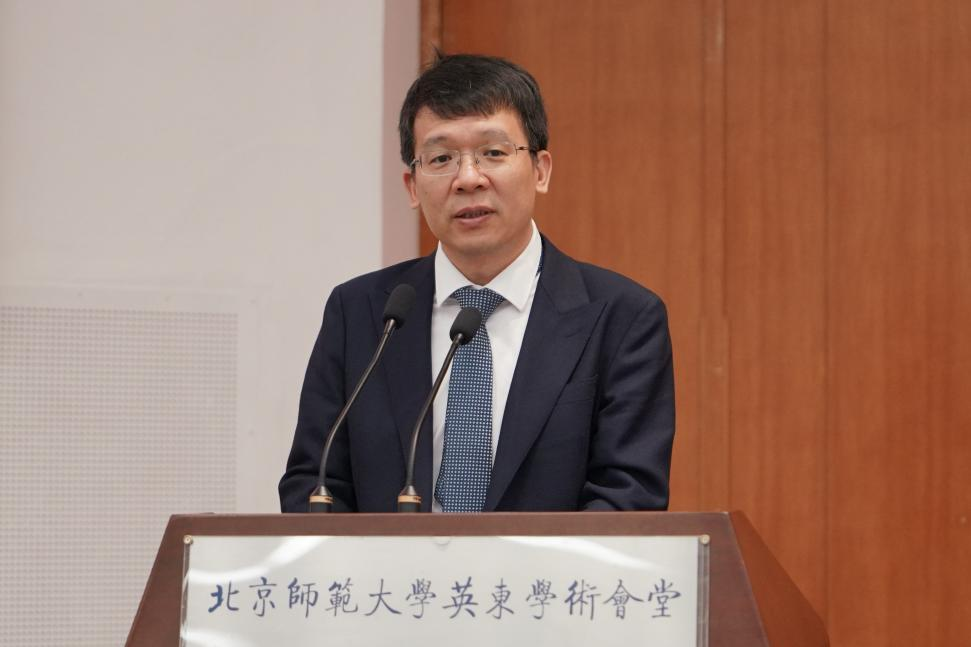
( Speech by Professor Chen Xing, Vice President of Beijing Normal University )
Yu Jianfu extended sincere greetings to the attending guests, faculty, and students, and expressed heartfelt gratitude to Beijing Normal University. He reviewed the ten-year development of the program and highly commended its significant contributions as a flagship initiative in cultural exchanges between China and other countries. The International Confucian Association has always been committed to building platforms for mutual learning among civilizations. This program has brought together over 300 young scholars from more than 50 countries and regions, becoming a cradle for nurturing cultural ambassadors. Many past participants have grown into key figures promoting the international dissemination of Confucianism and facilitating mutual learning among civilizations. Yu Jianfu encouraged the young scholars to cherish this learning opportunity, engage in open and inclusive exchanges of ideas and wisdom, and fully immerse themselves in the program to achieve meaningful insights and practical knowledge. He emphasized the importance of integrating learning with practice and called on them to contribute their youthful energy to advancing the Global Civilization Initiative.
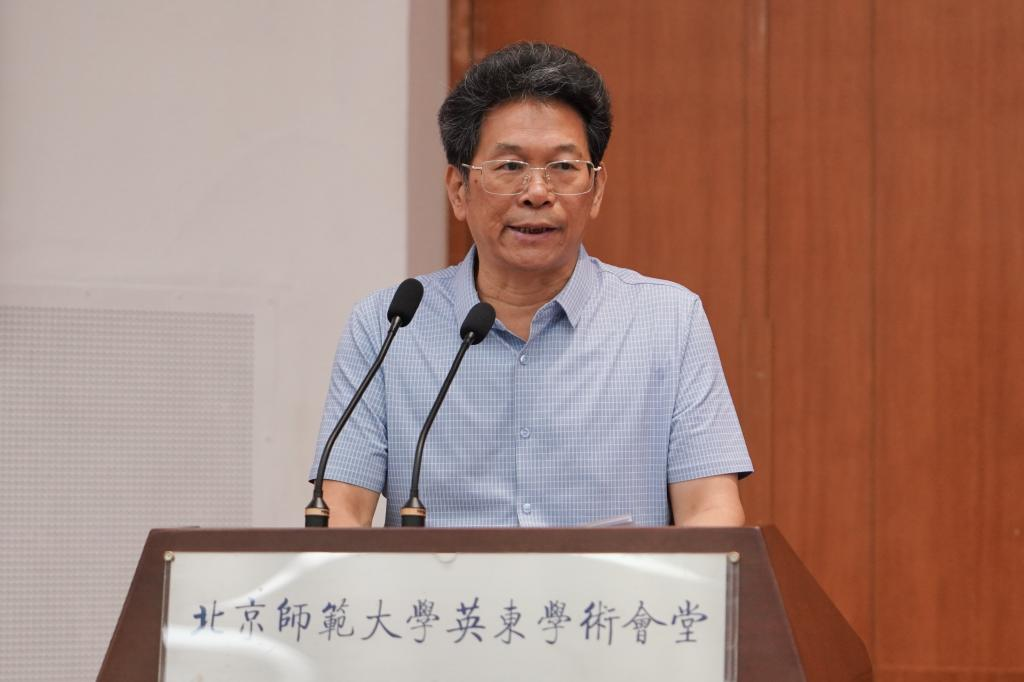
( Speech by Professor Yu Jianfu, Vice President of the International Confucian Association )
Ambassador Pablo Arriarán congratulated the successful opening of the event. The ambassador emphasized that this year marks the 55th anniversary of the establishment of diplomatic relations between Chile and China. The bilateral relationship, tested by time, has continued to deepen, with achievements in areas such as the construction of cultural landmarks, visa facilitation, and exchanges among young scholars, reflecting strengthened people-to-people bonds. Looking ahead, Ambassador Pablo Arriarán expressed Chile’s willingness to take the 55th anniversary as a new starting point to further deepen exchanges between young scholars of the two countries, advance dialogues in fields such as philosophy and artificial intelligence, and jointly envision a green, intelligent, and humanistic future. He called for guiding efforts with the light of philosophy to jointly write a new chapter in China-Chile relations and global civilizational cooperation!
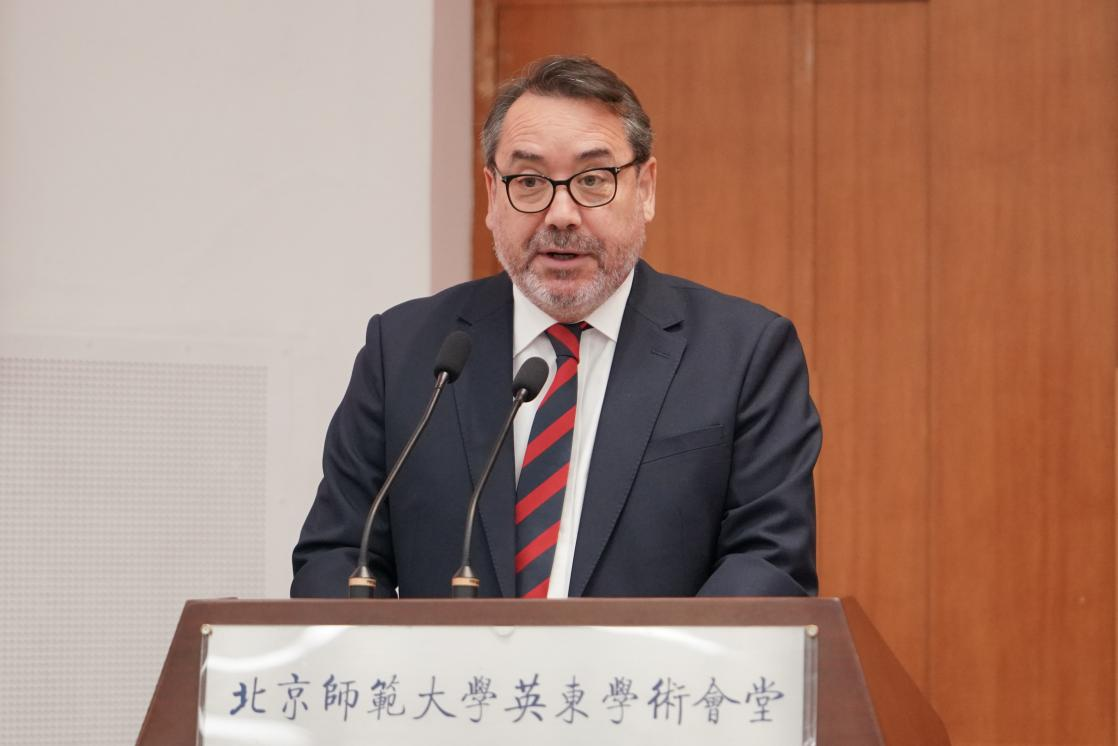
( Ambassador Pablo Arriaran of the Chilean Embassy in China delivered a speech. )
Wu Xiangdong, on behalf of the Research Center for Value and Culture and the School of Philosophy of Beijing Normal University, delivered a summary report on the decennial anniversary of the Jingshi Philosophy Summer School. He welcomed the attending experts and young scholars from various countries and expressed gratitude to the International Confucian Association, the Chinese Culture Institute | Jingshi Academy, and Vice President Chen Xing for their support of the program. He noted that the past decade has been a period of diligent cultivation, continuous exploration, and sustained innovation for the program. Through collaborative efforts, all parties have been committed to cultural exchange and civilizational dialogue, delving into core topics such as Confucian classics, Daoist wisdom, mutual learning between Eastern and Western civilizations, human nature and virtue, shared human values, and Chinese modernization under the theme of "Chinese Thought and Modern Civilization." Through various activities combining academia and experiential learning, participants have engaged with the practical dimensions of Chinese philosophy. Renowned scholars from top universities worldwide have been invited to deliver in-depth lectures from diverse perspectives, fostering intellectual collision. Generations of young scholars have gained understanding, forged friendships, and become participants and witnesses of civilizational dialogue. After a decade of careful nurturing, the "Chinese Thought and Modern Civilization" summer school has developed into a vital platform gathering global talents and promoting mutual learning between Chinese and foreign civilizations. This year’s program focuses on three themes: "Confucian Thought and Modern Life," "Classical Interpretation and Civilizational Mutual Learning," and "Artificial Intelligence and Humanistic Values," aiming to guide young scholars in exploring the modern application and humanistic value of Chinese wisdom and seeking inspiration for contemporary issues. The School of Philosophy at Beijing Normal University and the Key Research Base of the Ministry of Education, the Research Center for Value and Culture, have long been dedicated to the inheritance and international development of Chinese culture. They look forward to young scholars from various countries utilizing this platform to engage in in-depth exchanges and discussions aligned with the pulse of the times, jointly promoting the progress and development of human civilization.
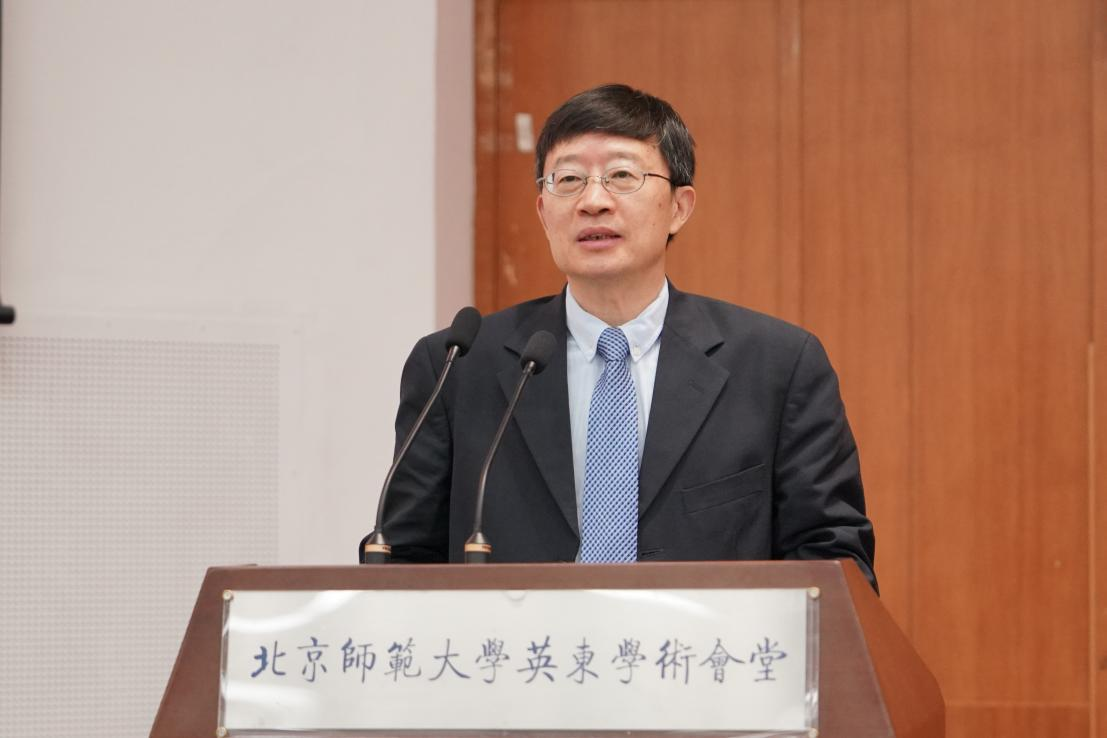
( Speech by Professor Wu Xiangdong, Dean of the School of Philosophy at Beijing Normal University )
Aryan Mohammad Hussain from Nanjing Normal University, a past participant, and Sherwood Zara Olivia from the University of Manchester, a current participant, delivered speeches. Aryan shared his insights from participating in the program, noting that it provides a valuable platform for global youth to explore Confucian thought and Chinese culture. He illustrated the commonality between core Confucian values, such as "filial piety," and the cultural values of his home country through personal experience. He recalled building deep friendships with participants from over 30 countries last year through open dialogue and mutual respect, encouraging current participants to deeply understand the practical significance of Chinese culture in modern society, foster dialogue with curiosity, build bridges with inclusiveness, and let diversity become a source of strength for civilizational mutual learning.
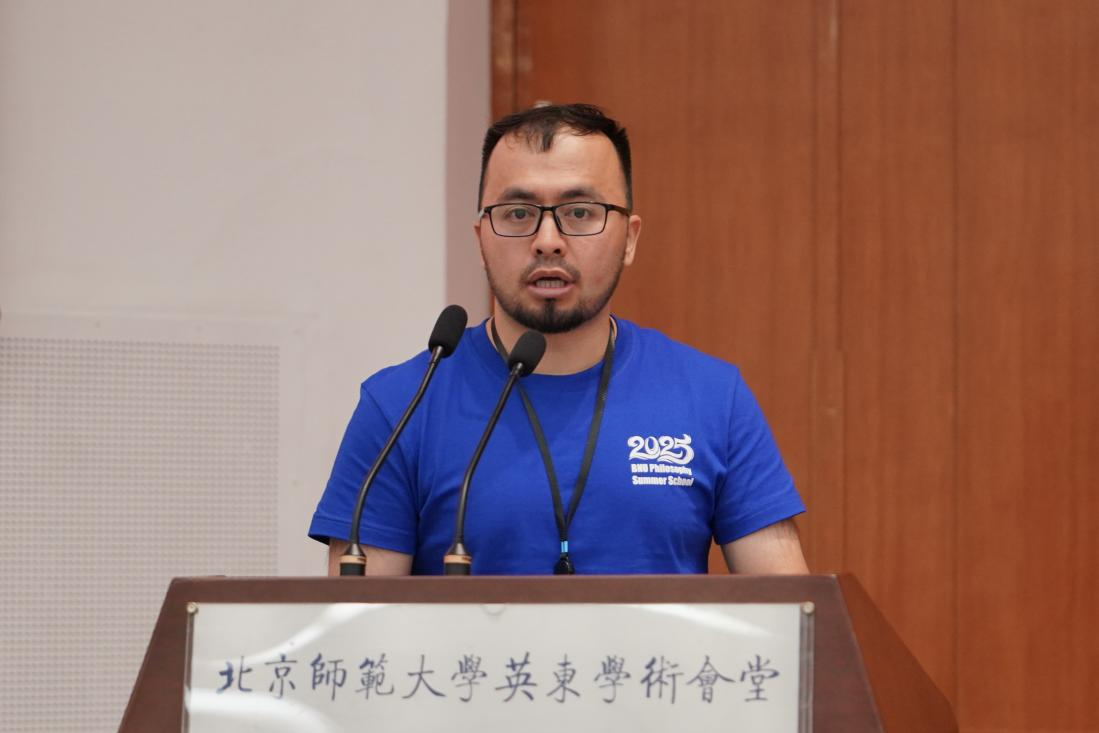
( Speech by Aryan Mohammad Hussain, Representative of Past Participants )
Sherwood Zara Olivia shared her understanding of Chinese culture in her speech. She believes that China's development over the past half-century stems not only from economic strategies but also from a philosophical tradition centered on Confucianism. While the West emphasizes individual innovation, China demonstrates collective strength and discipline rooted in the Confucian, Buddhist, and Daoist systems of thought, reflected in enduring core values such as respecting the elderly, valuing education, pursuing harmony, and fulfilling family and social responsibilities. China's success in integrating ancient wisdom into modern civilization lies in its continued relevance to contemporary society. Zara stated that this year’s program provides an excellent opportunity for global youth to study cultural differences. She looks forward to exchanging views with fellow participants, examining the foundations of their own civilizations, and exploring ways to balance individual, family, and societal needs.
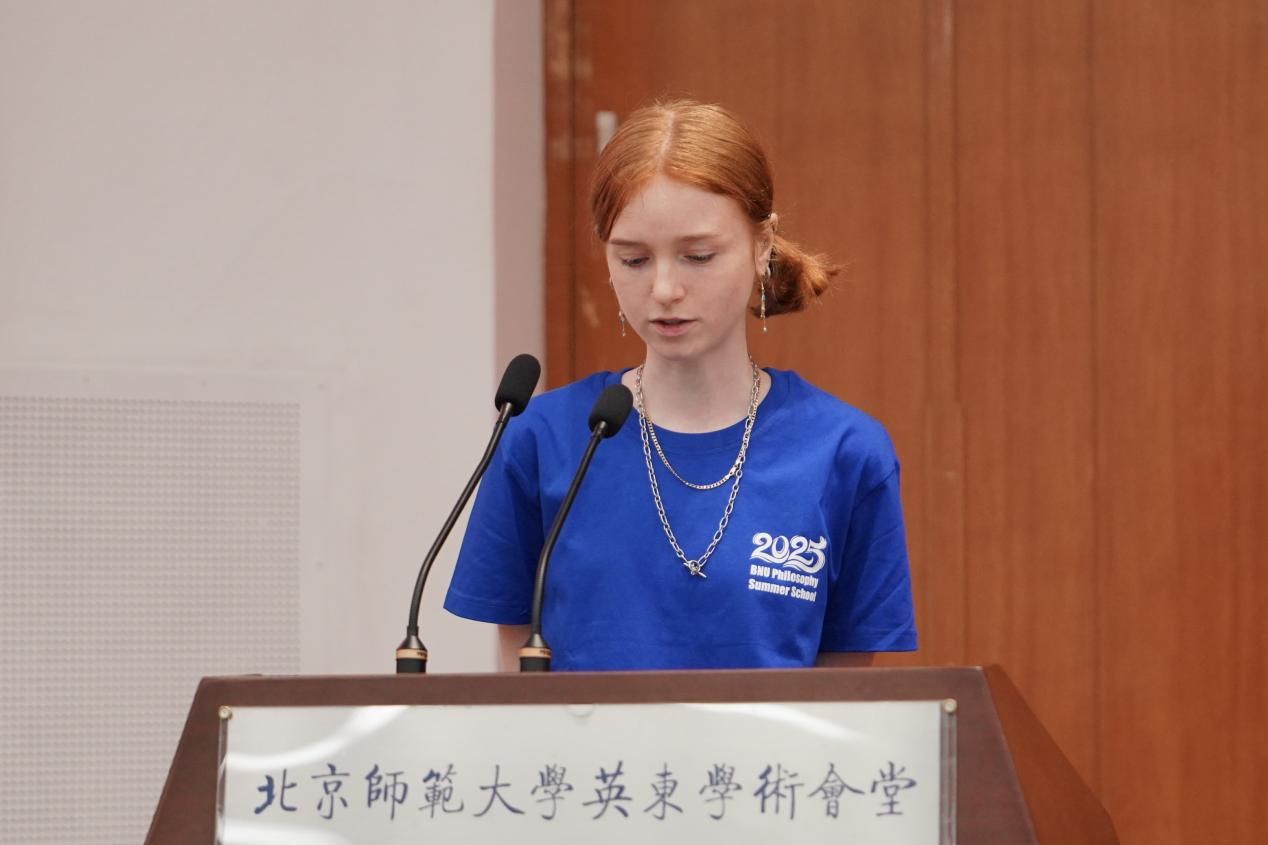
( Speech by Sherwood Zara Olivia, Representative of Current Participants )
Following the opening ceremony, Professor Han Zhen, Director of the Academic Committee of Beijing Normal University; Mircea Dumitru, Academician and Vice President of the Romanian Academy; and Thomas Michael, Research Fellow at the Research Center for Value and Culture of Beijing Normal University, delivered keynote reports.
Han Zhen delivered a thematic report titled "Civilization Develops Through Mutual Exchange and Learning." He argued that civilizational interaction must be based on an understanding of differences. Sharing three value principles for civilizational exchange, he emphasized: first, "empathetic understanding," which involves seeking a foundation for dialogue based on shared human needs, respecting the historical particularity of others, and overcoming cognitive limitations such as "idols of the tribe" and "idols of the cave"; second, "harmony in diversity," which is not only a strategy for interaction but also a prerequisite for its realization; and third, "fusion of horizons," which involves transcending the particularity of one’s own civilization through continuous dialogue to distill value consensus among civilizations. Empathetic understanding, harmony in diversity, and the concept of a shared world are value principles cherished by the Chinese nation, upheld by the Chinese people, and hold practical significance for handling international relations.
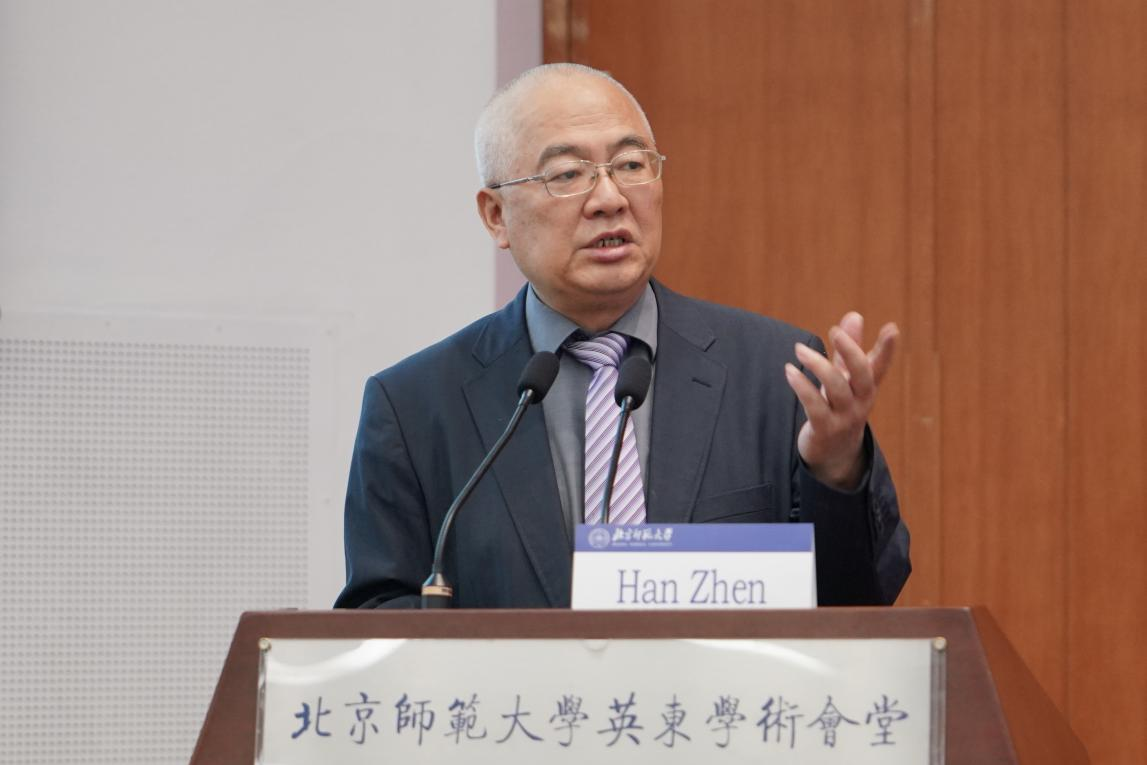
( Keynote Report by Professor Han Zhen, Director of the Academic Committee of Beijing Normal University )
Mircea Dumitru delivered a thematic report comparing Aristotle’s and Confucius’ views on friendship. Aristotle categorized friendship (Philia) into utility-based, pleasure-based, and virtue-based, emphasizing that virtue friendship is grounded in mutual recognition and promotes happiness through shared virtue, with its metaphysical basis lying in the love for individual substance rather than universal attributes. Confucius did not systematically classify friendship but incorporated it into a moral system encompassing ren (benevolence) and li (ritual), advocating "using friendship to support benevolence" and achieving self-improvement and social harmony through moral reflection. The commonality between the two lies in their transcendence of emotional bonds and rejection of utility and pleasure as the highest forms of friendship. The differences lie in Aristotle’s focus on the political value of friendship for rational life, while Confucius emphasized its educational function within hierarchical relationships; Aristotle took "self-love" as the starting point of friendship, while Confucius centered on "mutual respect." He expressed hope that such a comparison would provide an interesting case for glimpsing the mutual learning and contrast between the wisdom of different ancient civilizations.
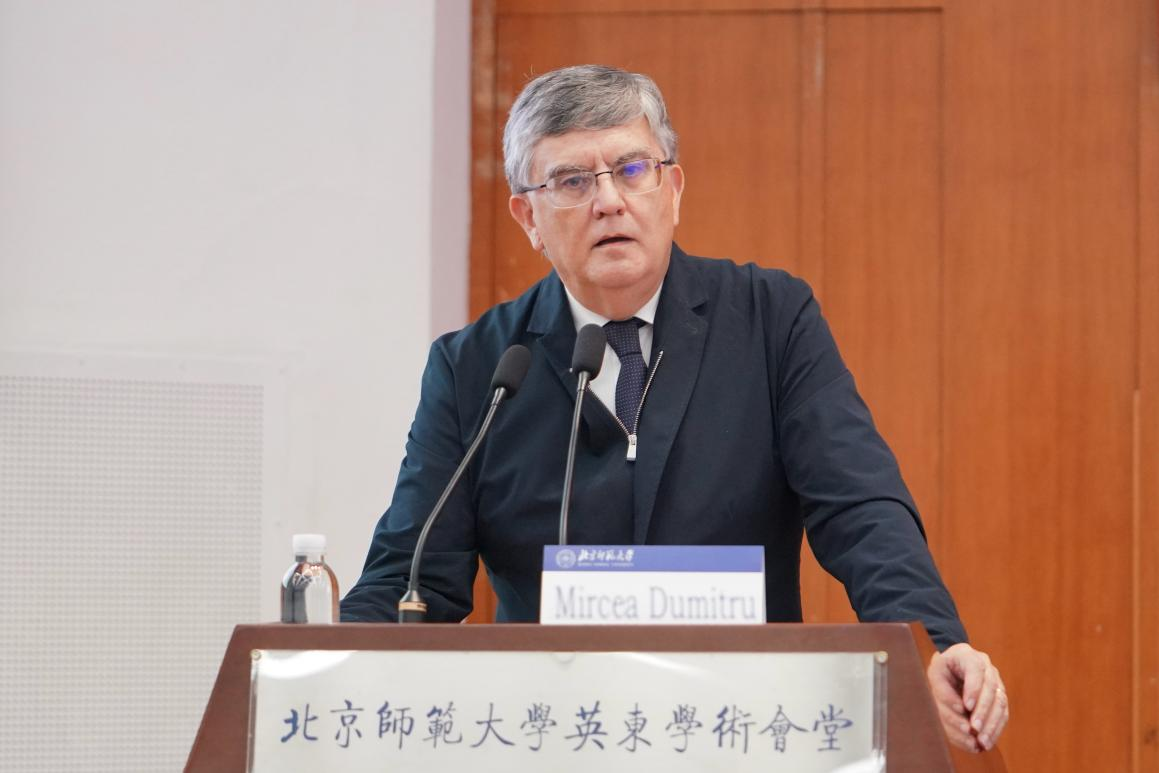
( Keynote Report by Mircea Dumitru, Academician and Vice President of the Romanian Academy )
Thomas Michael shared insights on the symbiotic relationship between Chinese thought and modern civilization. Positioning "Chinese Thought" alongside "Modern Civilization" has become a profound innovation in today’s global context, reflecting the leading role of Chinese thought in the global civilizational process and highlighting the necessity of cross-cultural dialogue. Philosophy not only provides foundational support for technology and society but also offers meaning and direction in addressing the crises of modernity. He systematically explained the value of comparative philosophy, advocating for mutual learning between Chinese and Western philosophies to explore topics such as self-conception, ethical models, and ecological philosophy. He pointed out that traditional Chinese wisdom, such as the concepts of "ren" (benevolence), "he" (harmony), "de" (virtue), "qi" (vital energy), and "tian ren he yi" (harmony between humanity and nature), holds significant revelation for building a sustainable, inclusive, and humanistic modern civilization. He encouraged young scholars to use comparative philosophy as a bridge to promote the joint construction and integration of a global community of civilizations.
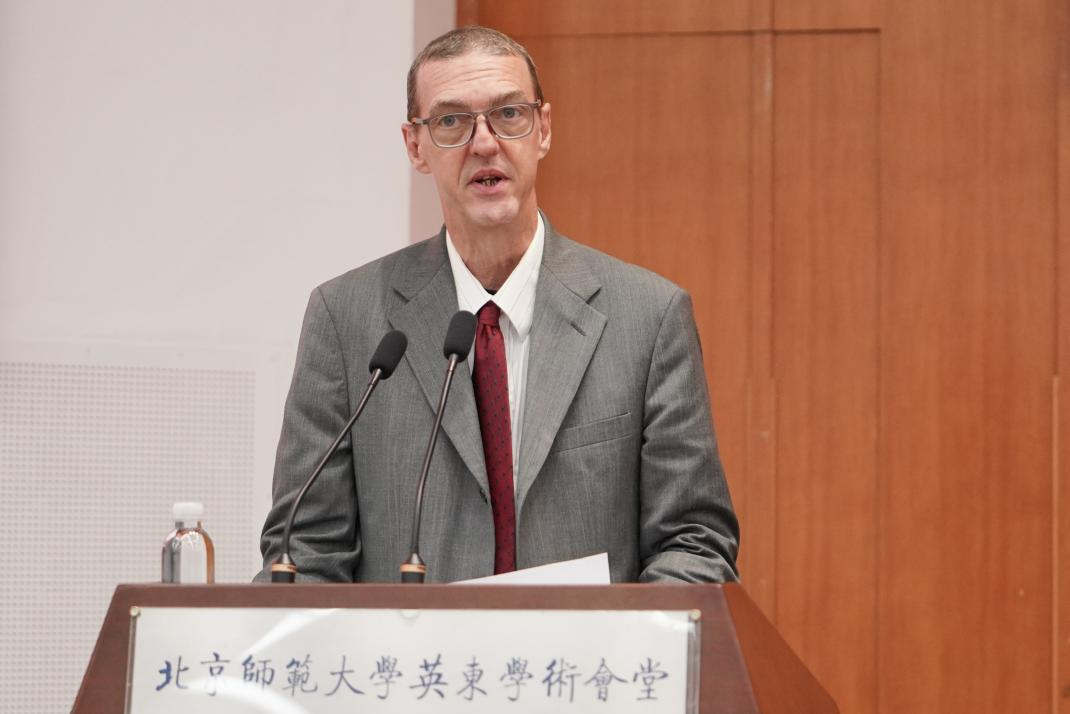
( Researcher Thomas Michael from the Research Center for Value and Culture at Beijing Normal University )
In a warm and vibrant atmosphere, the opening ceremony of the "Decennial Celebration of the Jingshi Philosophy Summer School, the 10th Jingshi Philosophy Summer School, and the 6th International Youth Program on Chinese Culture" concluded perfectly.
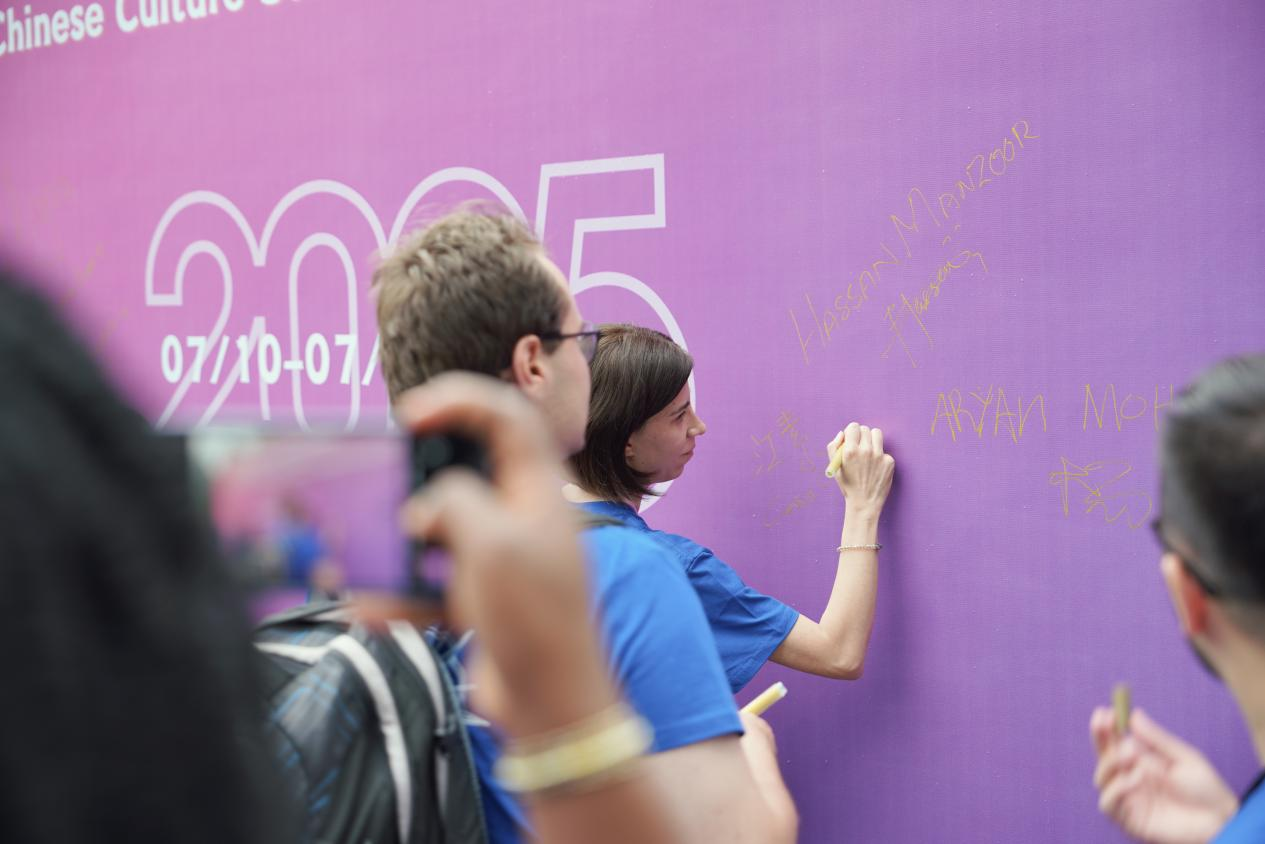
( Participants signing autographs for souvenirs )
As an important part of the decennial celebration activities, the summer school specially held a "Youth Leadership Workshop" on the afternoon of the same day, hosted by Professor Jiang Limei from the School of Philosophy at Beijing Normal University. Xiao Kai, Vice Dean of the Jingshi Academy, first delivered a speech, fondly recalling the origins and initial challenges of the international summer school program. He affirmed the importance of continuously deepen cultural exchanges and expressed his expectations for the "Youth Leadership Workshop" to promote mutual "dialogue" among young scholars.
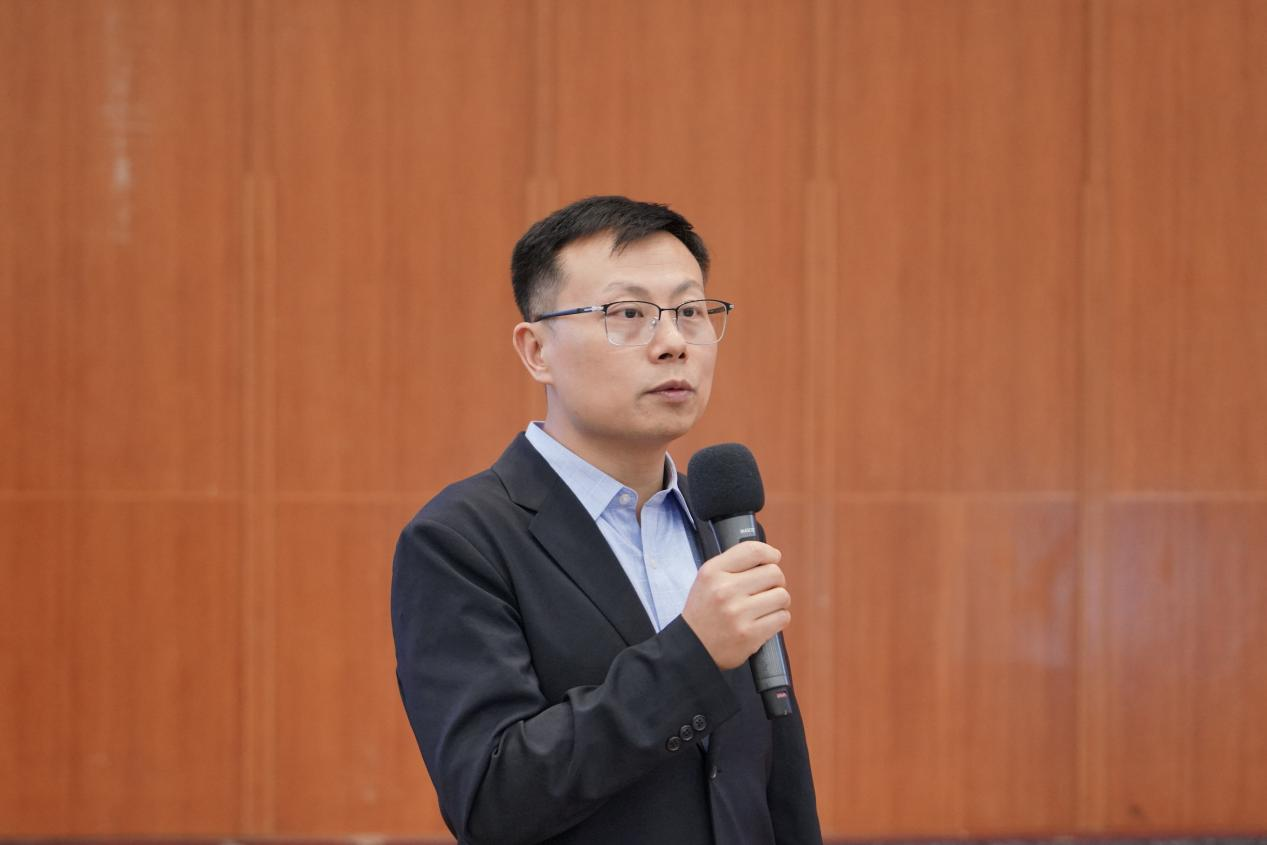
( Speech by Xiao Kai, Vice Dean of the Jingshi Academy )
Subsequently, representatives of past participants shared their latest research on Chinese philosophy and socio-cultural issues, drawing on their cultural experiences and philosophical explorations during previous sessions.
Lucas Scripter, a 2018 participant from the Hong Kong Polytechnic University (American nationality), began with classic parables from the "Zhuangzi," such as "Three in the Morning, Four at Night" and "The Use of the Useless," reflecting on the rich possibilities of the meaning of life. He advocated for an active approach to fully utilize the imagination (Imaginative Agency) to address the dilemmas of life’s meaning and break through the rigid perspectives of contemporary theories.
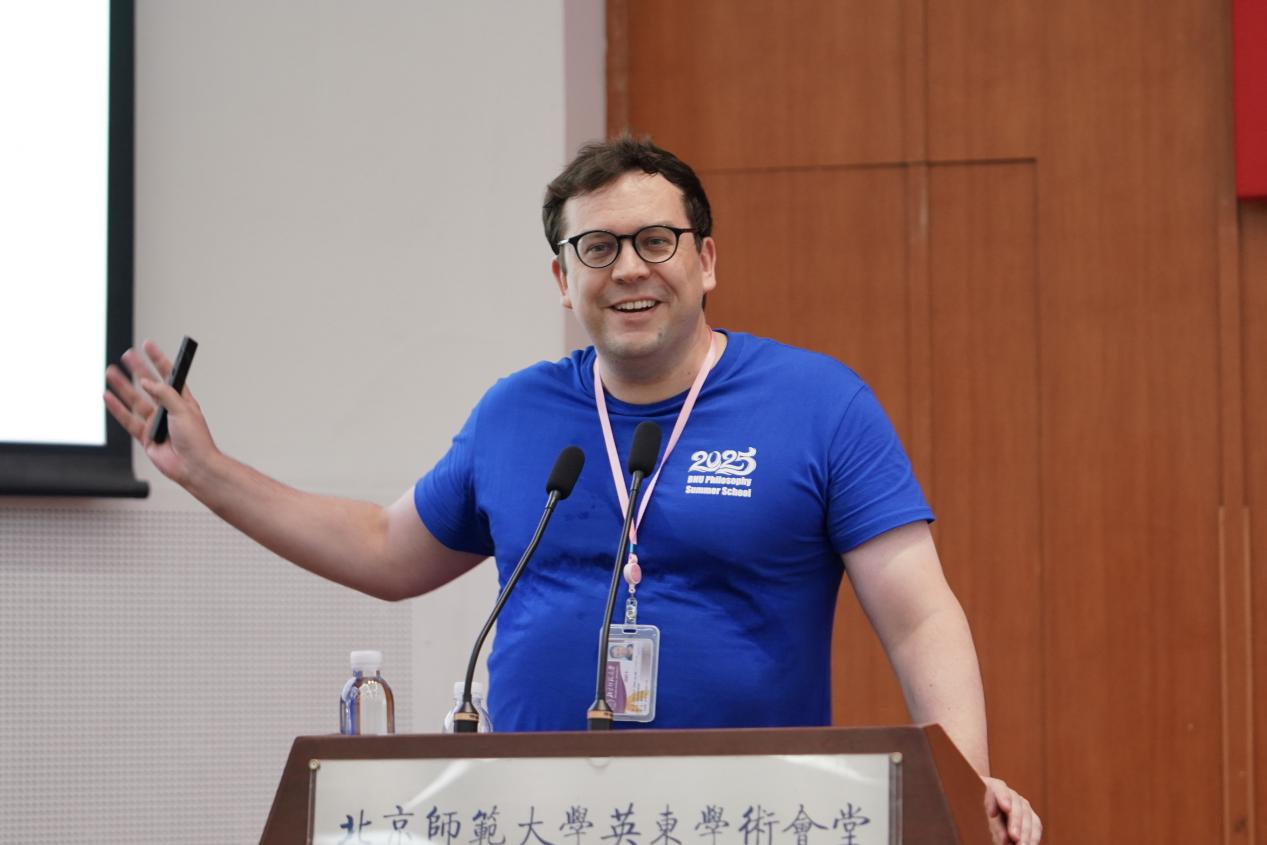
( Speech by Lucas Scripter )
Hazman Baharom, a 2021 participant from Waseda University (Japan), shared experiences on the topic of "Philosophical Practice in the Malaysian Context." He emphasized the potential of philosophy as a communication platform across religious systems and knowledge frameworks in a multicultural society, pointing out its unique public value in youth education, daily life, and intellectual dialogue.
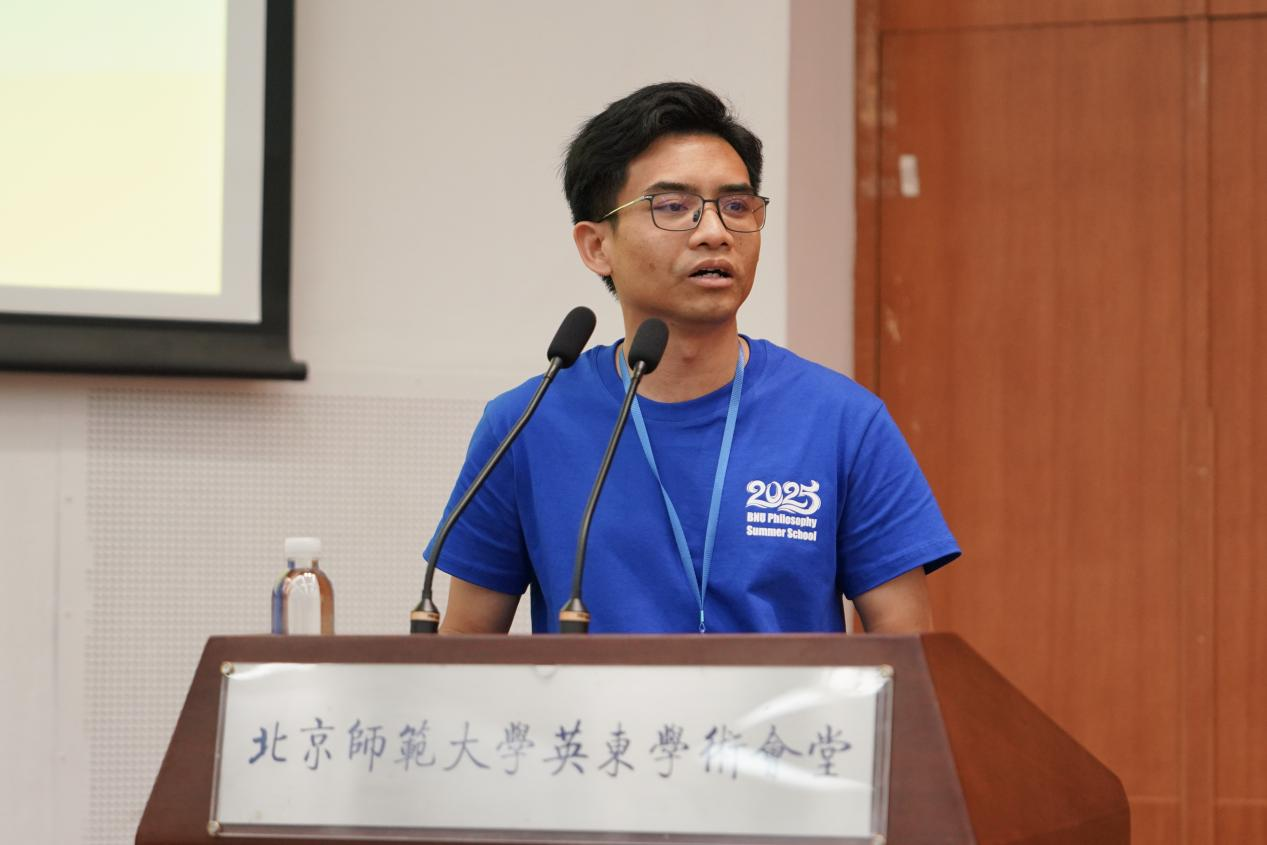
( Speech by Hazman Baharom )
Liu Huaqing, a 2022 participant from Renmin University of China (Singaporean nationality), shared new philosophical reflections on the concept of "tian" (heaven) in the "Analects." He explored the multiple facets of "tian" in Confucian classics, proposed the profound connection between "tianming" (mandate of heaven) and "tian," and pointed out that the Confucian concept of "tianming" offers rich dimensions for contemporary philosophical discussions.
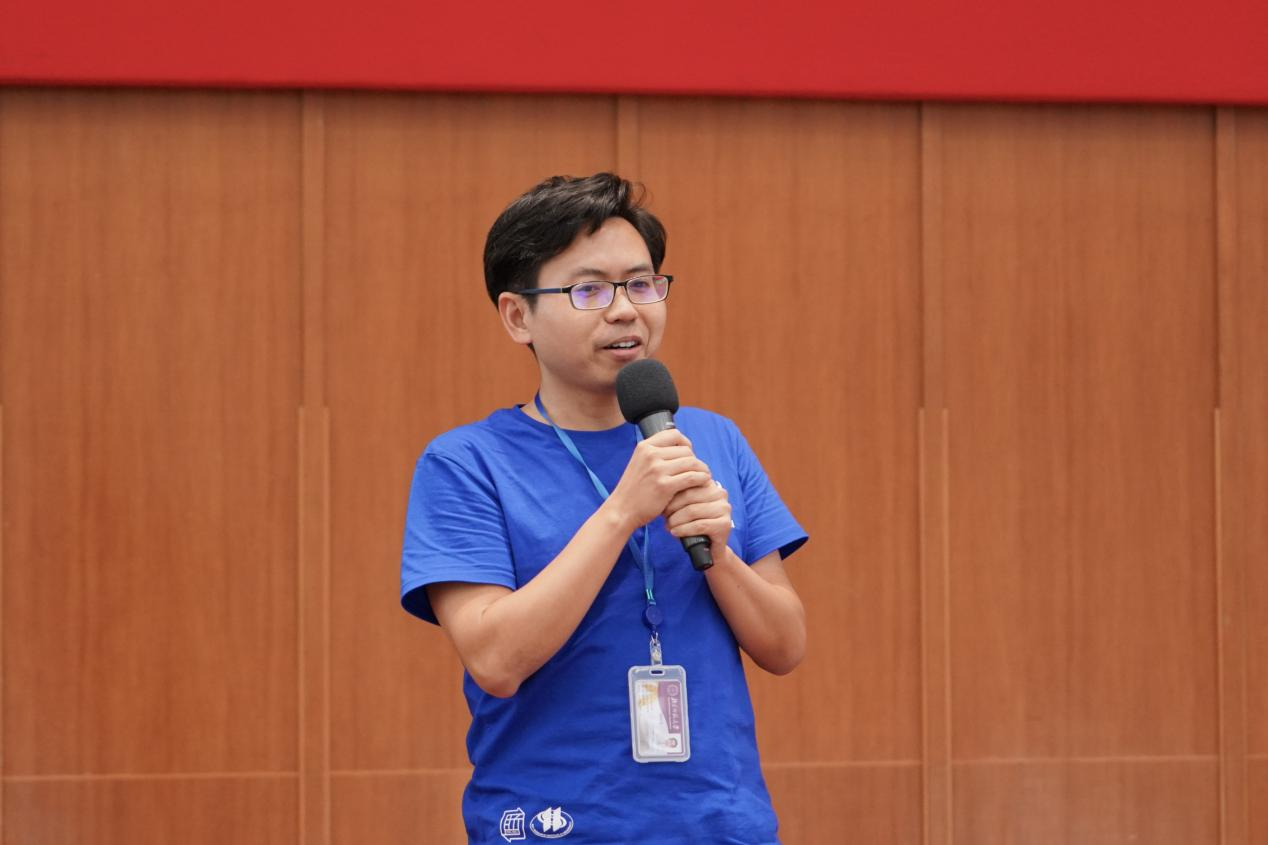
( Speech by Liu Huaqing )
Constanza Fernanda Jorquera Mery, a 2022 participant from the University of Santiago, Chile, discussed the commonality of "Humanity" in Sino-Chilean foreign policies. She pointed out that, based on ideological resources such as the humanistic spirit of Confucianism, the diplomatic cooperation between China and Chile emphasizes humanitarian principles and transnational win-win collaboration, reflecting a sense of responsibility in addressing challenges in the era of globalization.
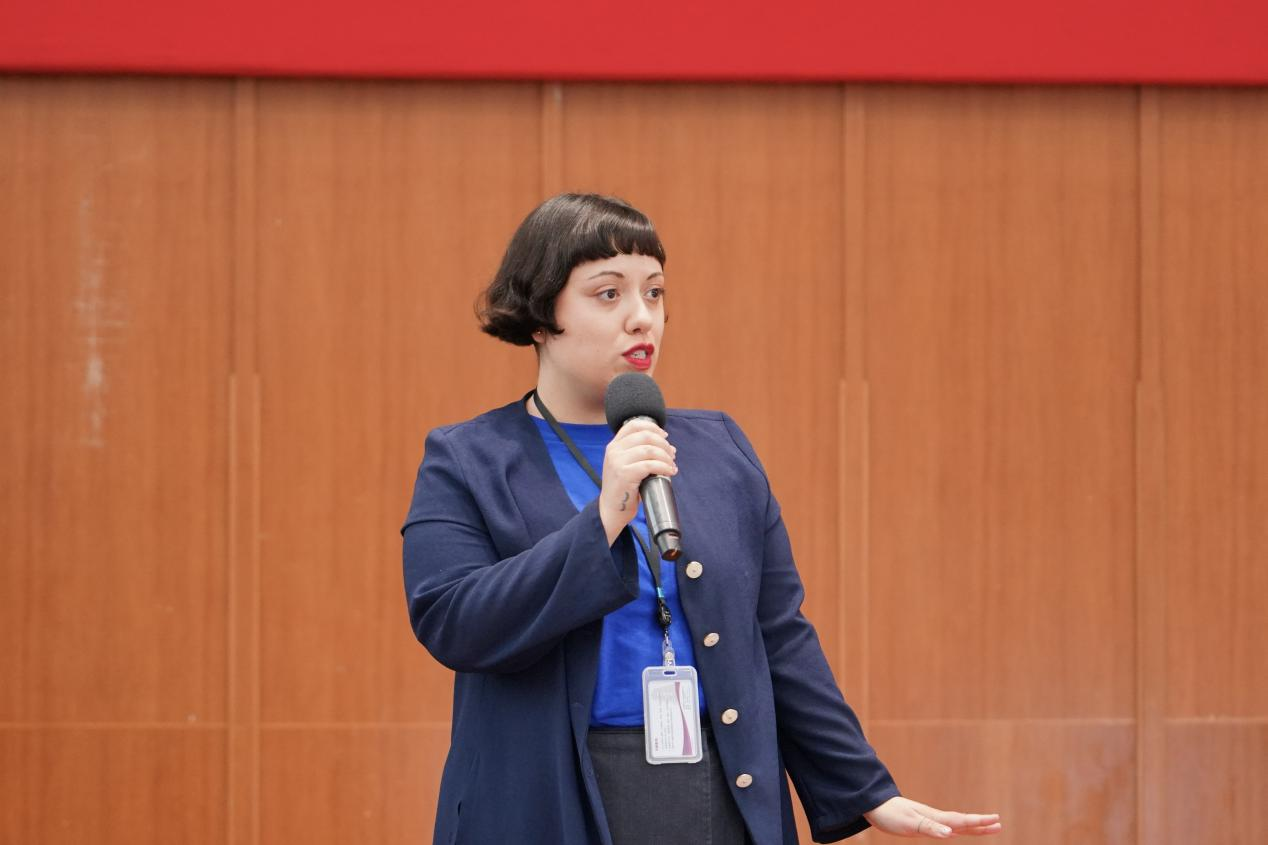
( Speech by Constanza Fernanda Jorquera Mery )
Pilar Sánchez Ordóñez, a 2023 participant from the University of Buenos Aires (Argentina), explored how Confucian thought responds to contemporary democratic crises, reflecting on cutting-edge political philosophy topics such as the "tianxia system." She advocated for a new path of wise democracy that integrates moral care and civic rationality.
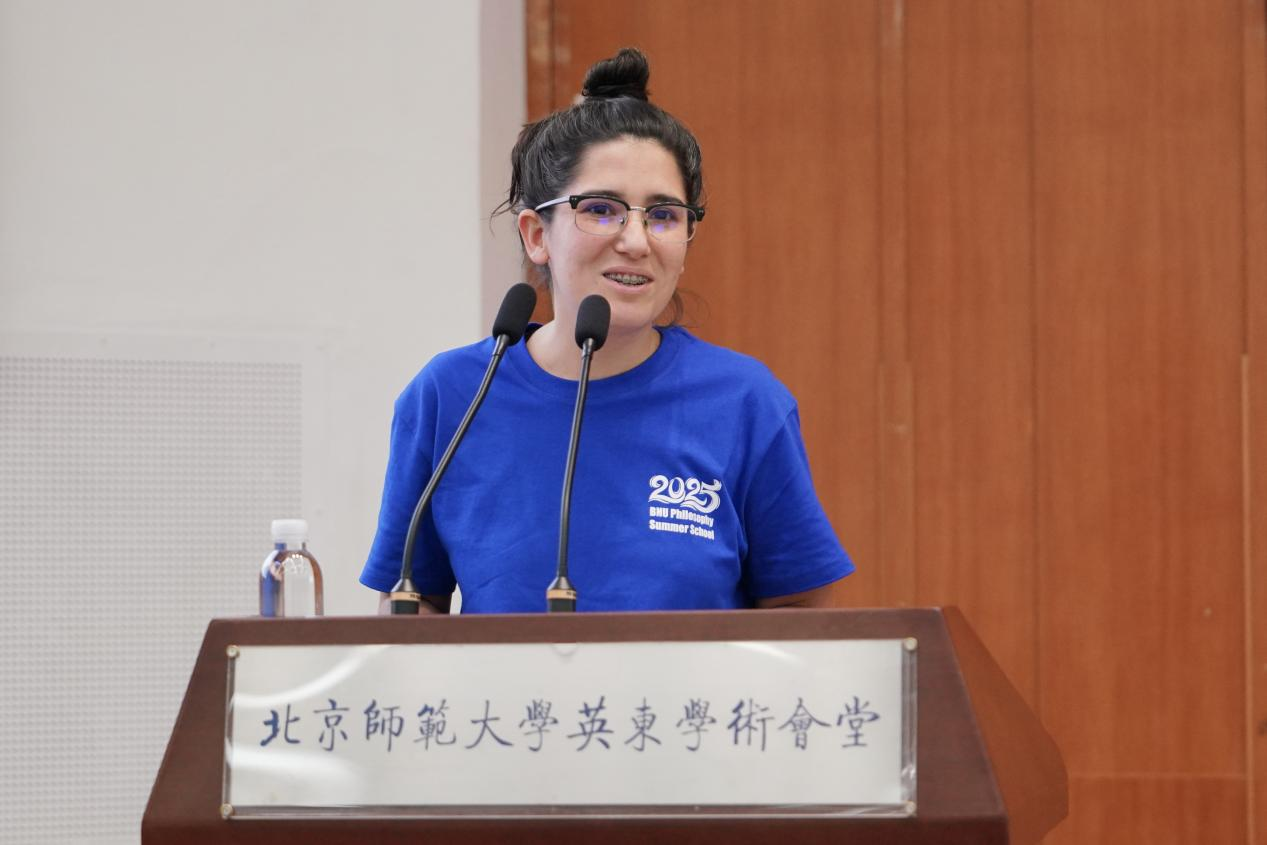
( Speech by Pilar Sánchez Ordóñez )
Tlesh Mamakhatov, a 2023 participant from the Institute of China and Contemporary Asia at the Russian Academy of Sciences, analyzed China’s moral leadership role in promoting BRICS and the Global South, with economic cooperation, multipolarity, and common development at the core, toward building a more just and sustainable international order.
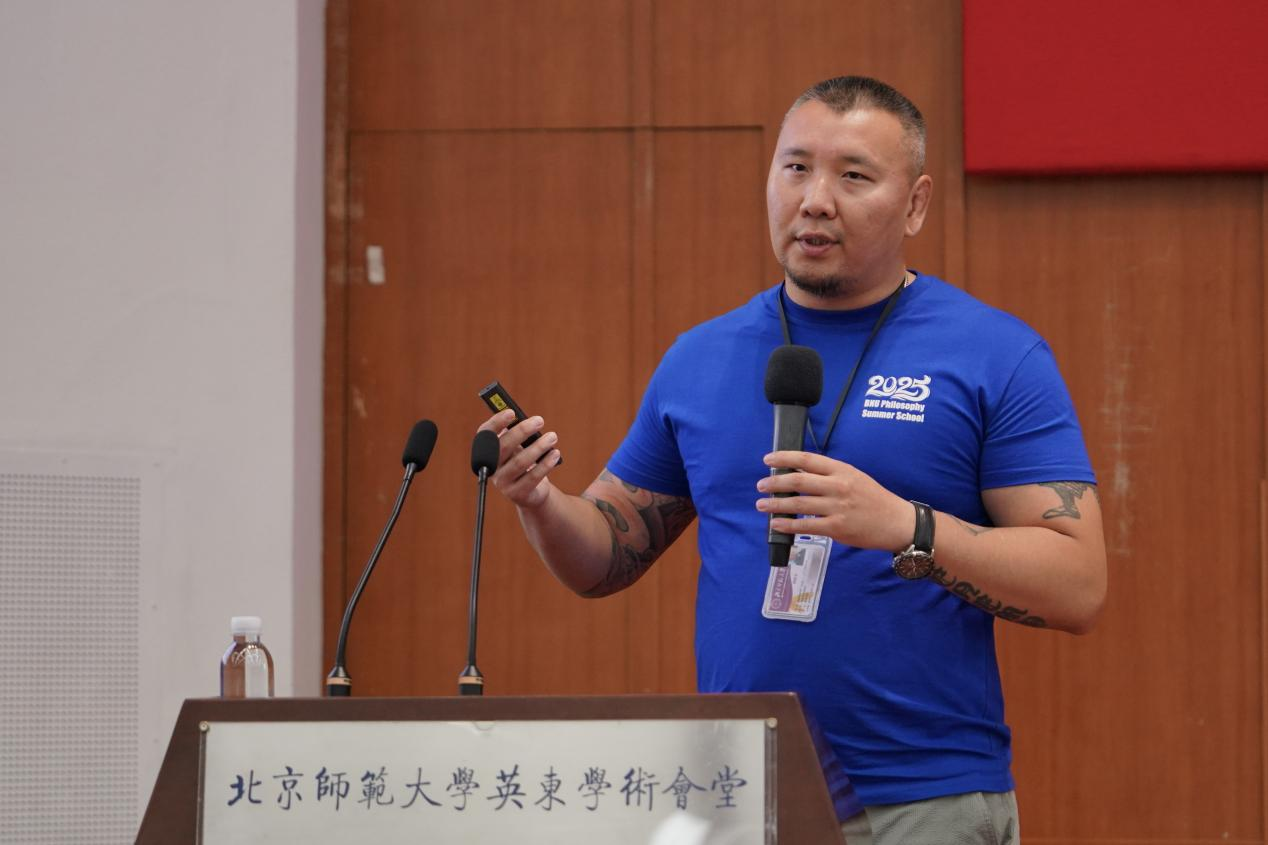
( Speech by Tlesh Mamakhatov )
Gabriel Jacobina Marques, a 2023 participant from the Federal University of Rio de Janeiro (Brazil), discussed how the Confucian concept of the "state" challenges modern secular political thought. He proposed that China, by integrating historical materialism and Confucian philosophy, is leading the innovation of global political philosophy in building a new type of socialist state.
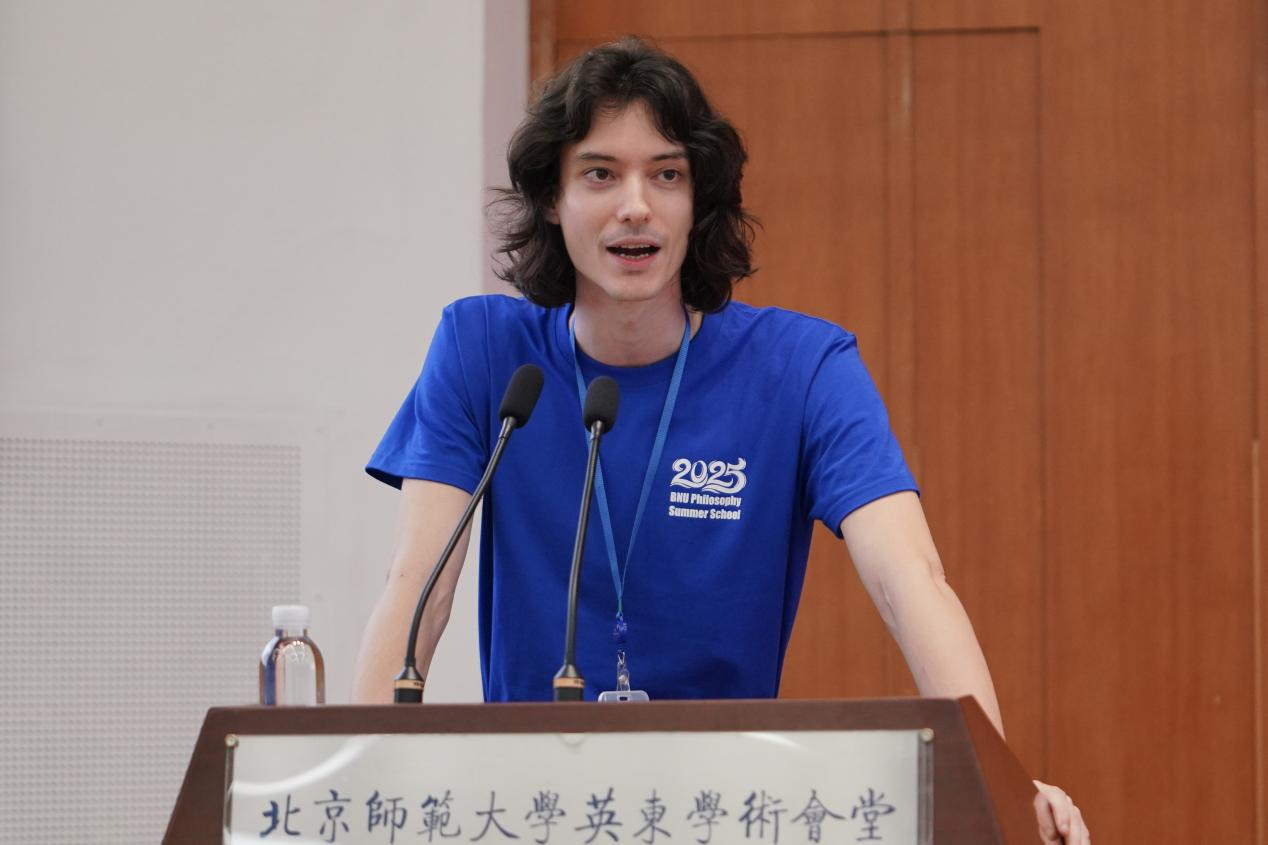
( Speech by Gabriel Jacobina Marques )
Aryan Mohammad Hussain, a 2024 participant from Nanjing Normal University, discussed the value of the concept of "harmony in diversity" in the cross-cultural language dissemination of the "Belt and Road" initiative. He explored the unique significance of this concept in the construction of Confucius Institutes and the promotion and shaping of the international image of the Chinese language.
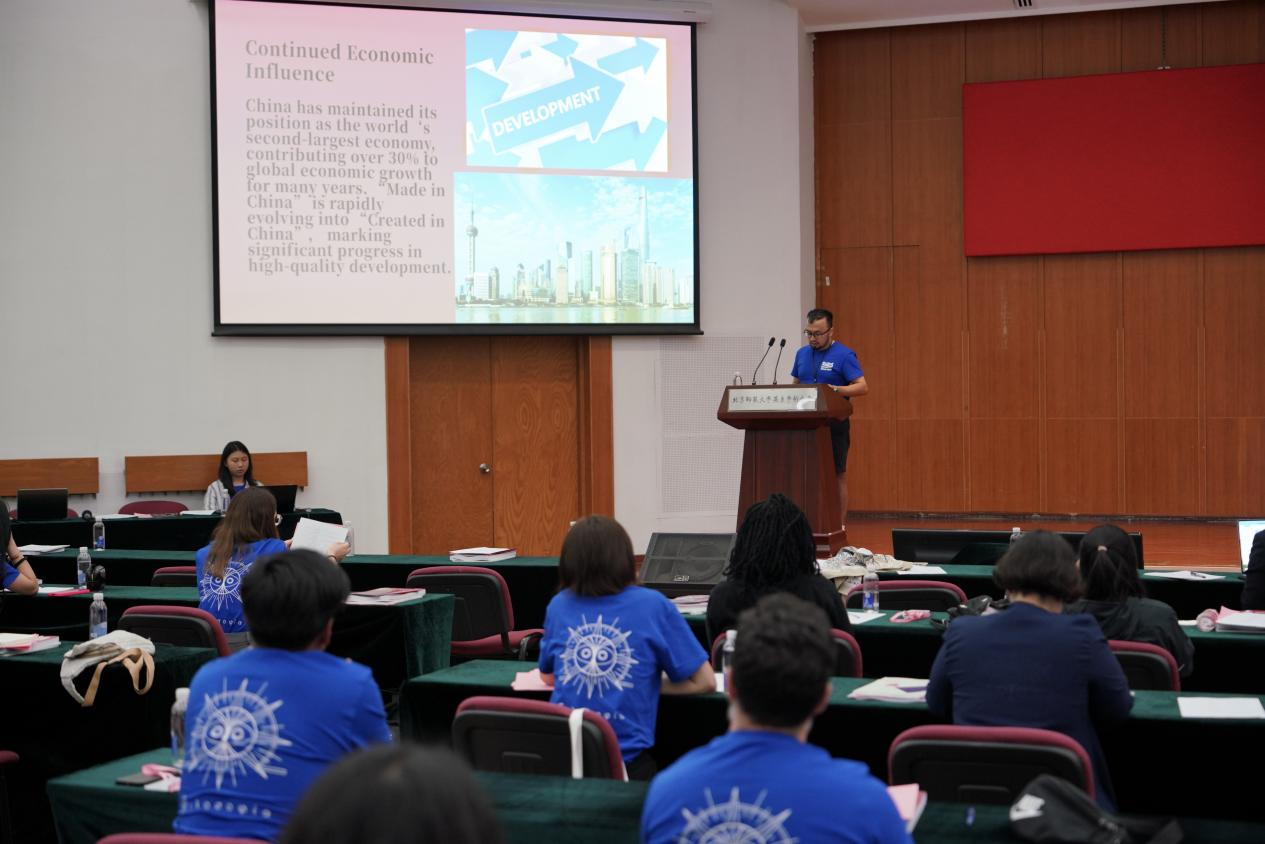
( Speech by Aryan Mohammad Hussain )
During the free discussion session, introduced by Thomas Michael, a researcher from the School of Philosophy at Beijing Normal University, teachers and students engaged in lively discussions on topics such as the revelation of the concept of "harmony in diversity" for philosophical discourse, philological analysis and cross-linguistic communication, the religious dimensions of Chinese philosophy, and differences in the knowledge structures of Eastern and Western philosophy. Professor Riccardo Pozzo from the University of Rome II and Professor Tobias Zürn from the Hong Kong University of Science and Technology participated as commentators.
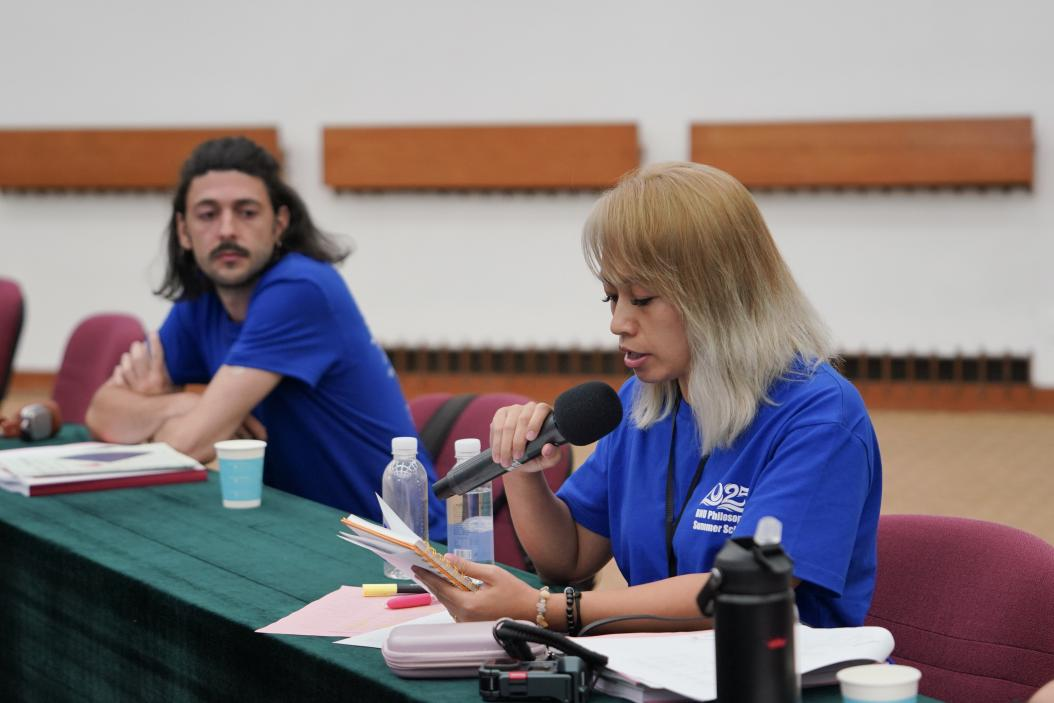
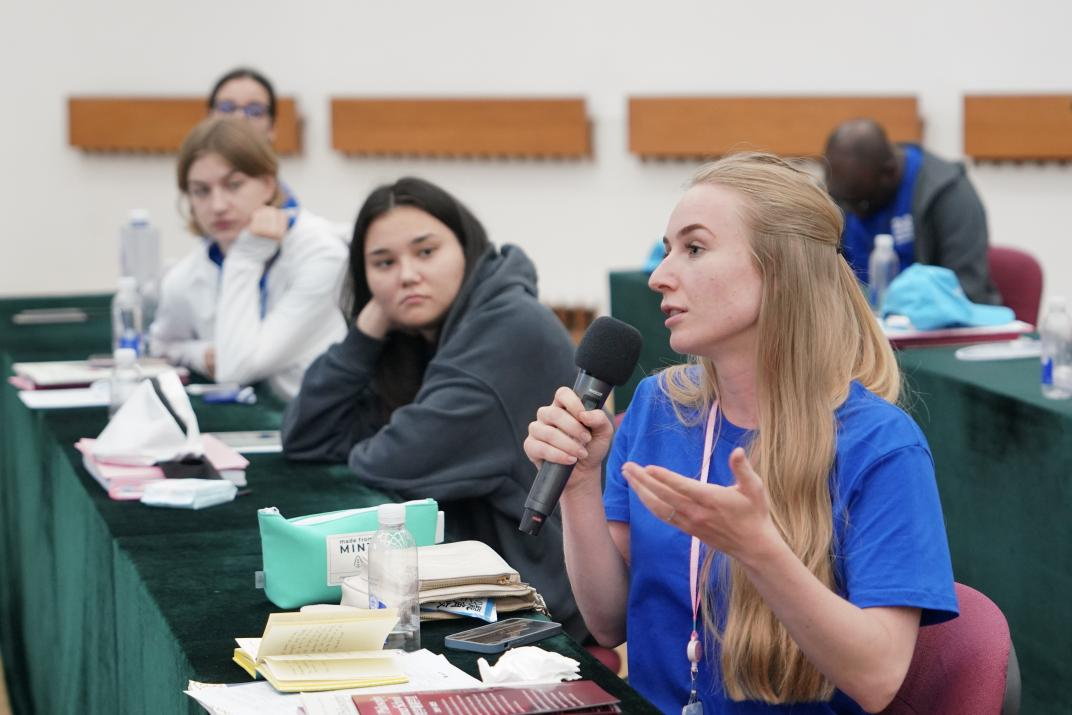
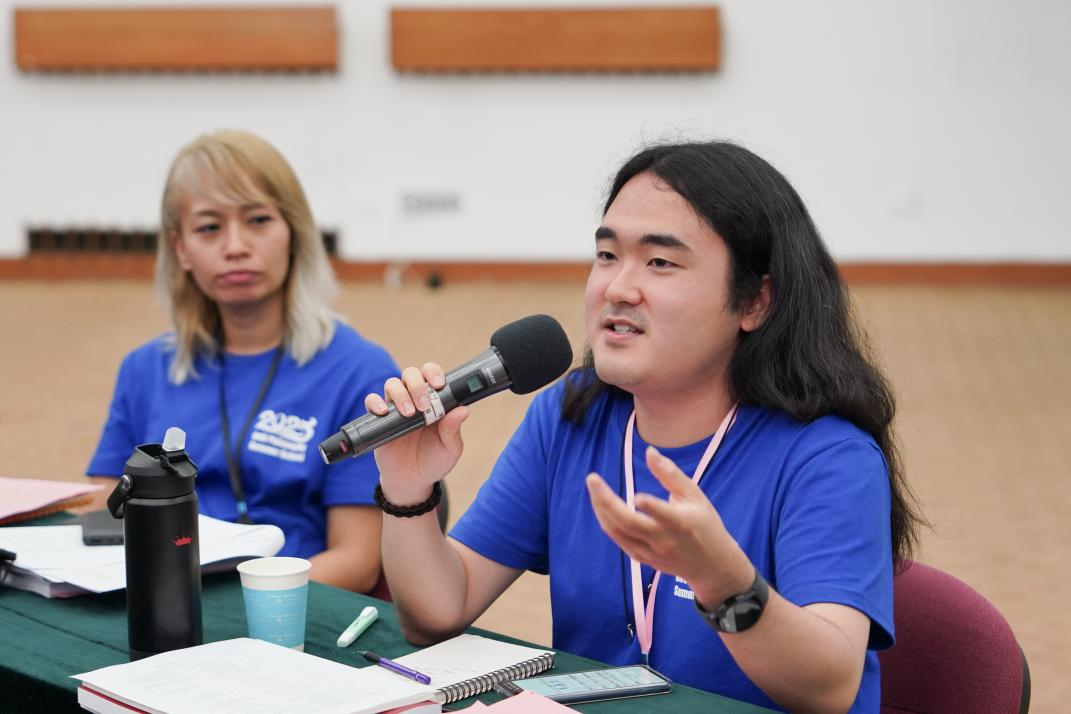
( Participants engaging in discussions )
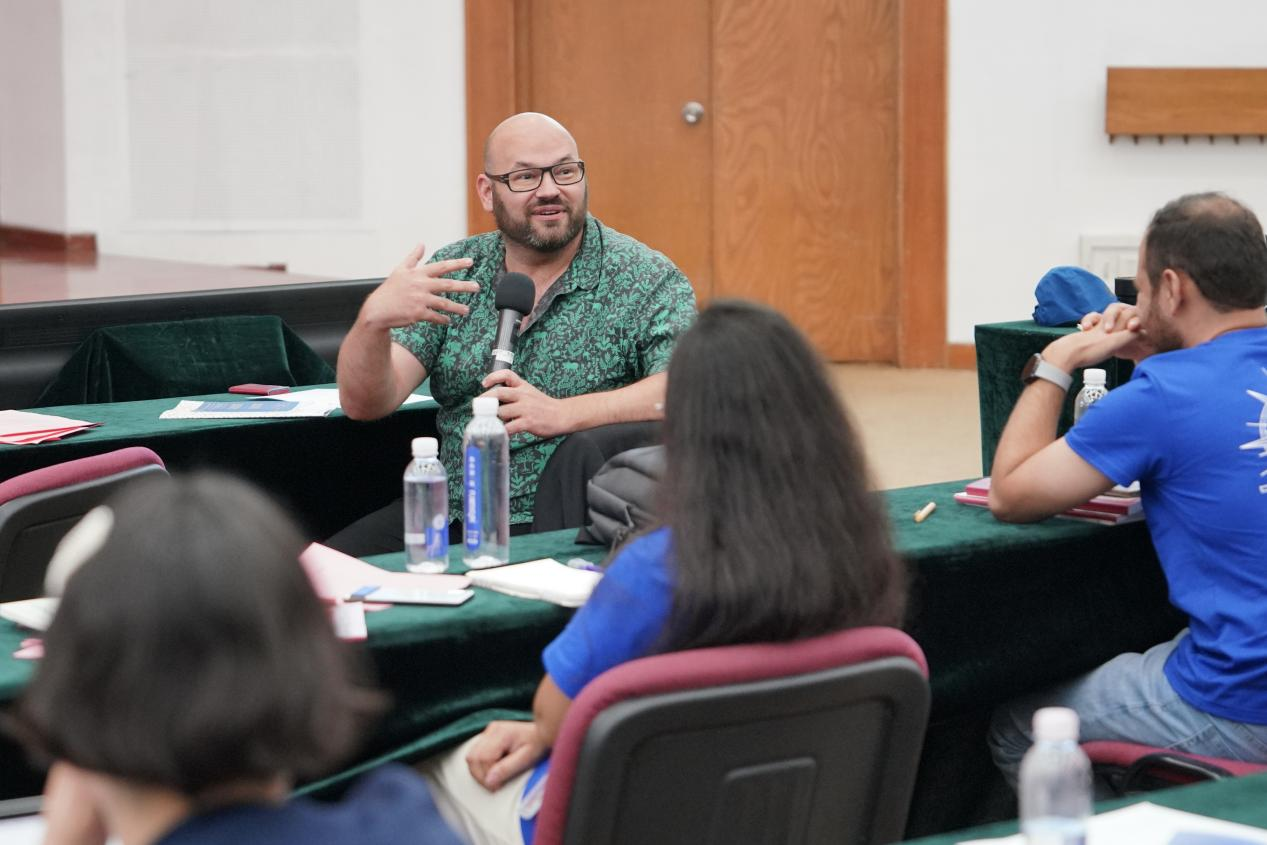
( Commentary by Professor Tobias Zürn from the Hong Kong University of Science and Technology )
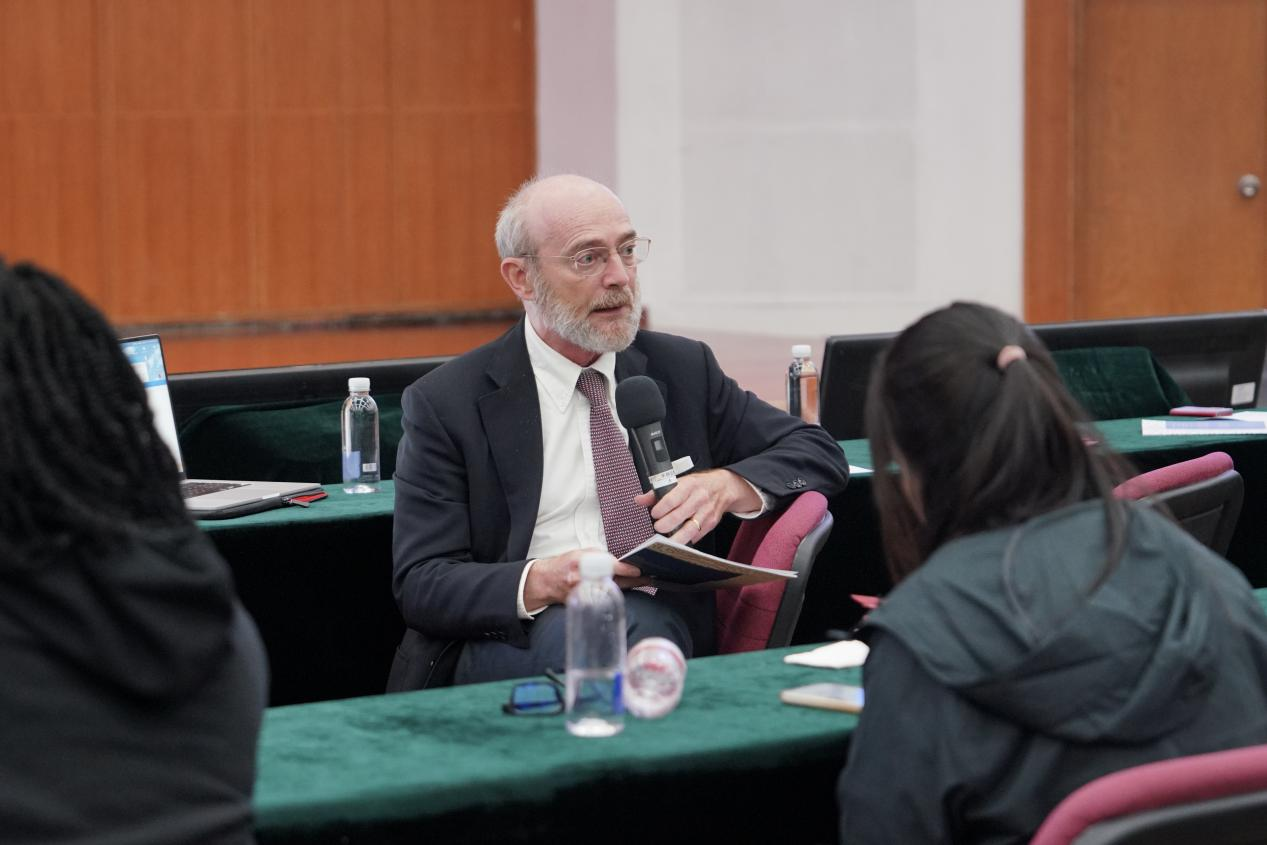
( Commentary by Professor Riccardo Pozzo from the University of Rome II )
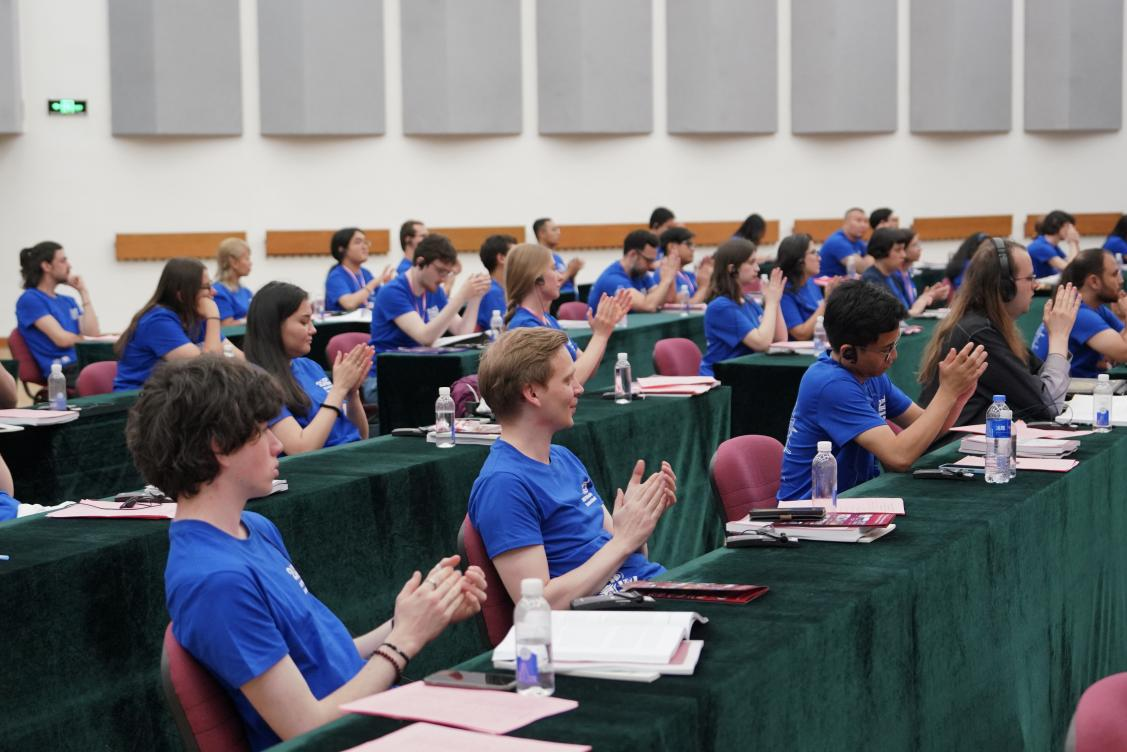
( The atmosphere was lively )
The 10th Jingshi Philosophy Summer School in 2025 has welcomed 42 young scholars from 33 renowned domestic and international universities. They will engage in rich academic activities, sharing and discussing the core values of Chinese culture with global youth. Over the course of more than ten days, participants will take part in a variety of activities, including series of lectures, "Thinking China Roundtable Forums," cultural experiences, study tours, group discussions, artistic creations, and academic presentations. Through the model of "academic discussion and cultural experience," they will enhance their understanding and awareness of the core values of traditional Chinese culture and contemporary Chinese civilization, promoting extensive and in-depth exchanges among young scholars from various countries.
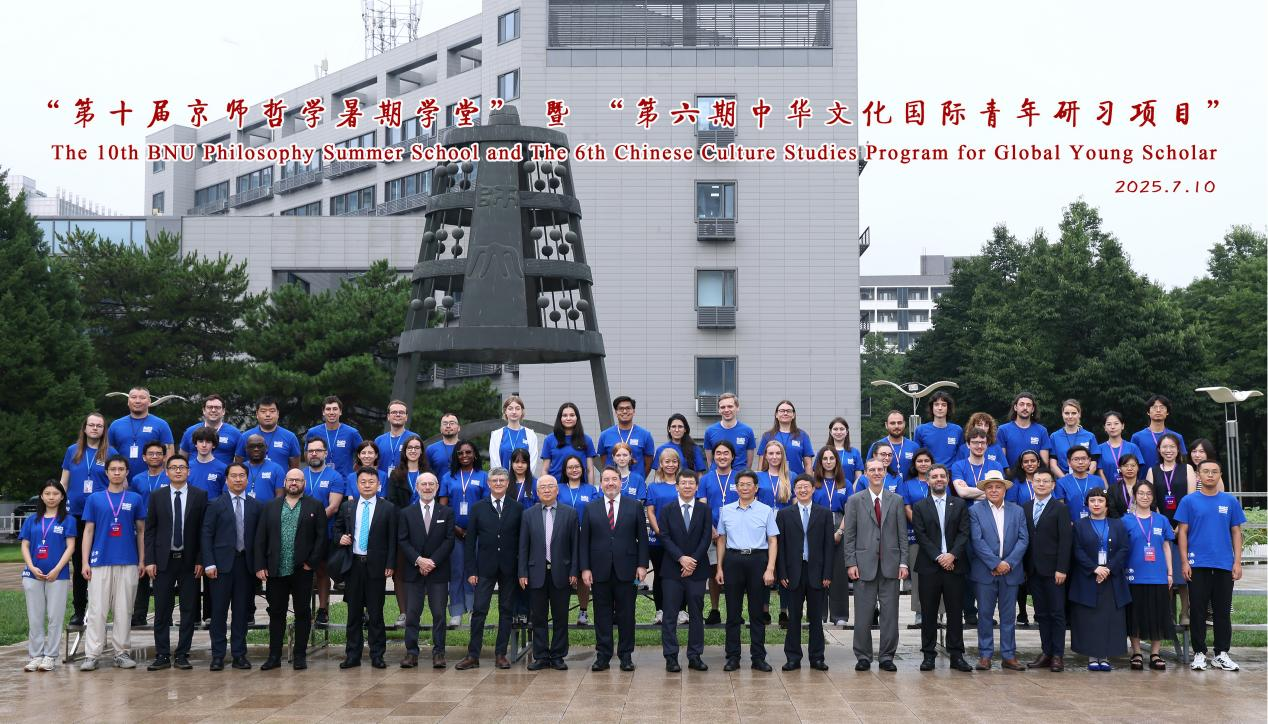
( Group Photo )
Copyright 2020. All Rights Reserved Record No. Beijing ICP Ready





 Tel:010-58802001
Tel:010-58802001  Fax:010-58802001
Fax:010-58802001  E-mail:philoffice@bnu.edu.cn
E-mail:philoffice@bnu.edu.cn Address :19 Xin Jie Kou Wai St., HaiDian District,Beijing 100875, P. R. China 8th. Floor. Front Main Building
Address :19 Xin Jie Kou Wai St., HaiDian District,Beijing 100875, P. R. China 8th. Floor. Front Main Building
